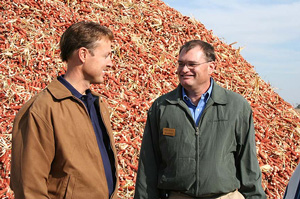 The Stanton Wind Energy facility in Martin County, TX is winding down construction and estimates its facility will be fully operationally by early 2008.
The Stanton Wind Energy facility in Martin County, TX is winding down construction and estimates its facility will be fully operationally by early 2008.
Invenergy Wind LLC has announced the successful closing of construction and equity financing for its 120 MW Stanton Wind Energy Center (“Stanton”) in Martin County, Texas. The debt facility was underwritten by lead arranger Dexia Credit Local and co-arranger Natixis. The equity will be provided by GE Energy Financial Services.
Stanton will utilize 80 General Electric 1.5MW SLE wind turbines and construction is being managed by DH Blattner & Sons. Full commercial operation of the wind farm is scheduled for early 2008. The project interconnects with Oncor, the transmission affiliate of TXU, and all power will be sold into the ERCOT market. Energy price risk is hedged through a long-term agreement with Credit Suisse Energy. The wind farm will be owned and operated by Invenergy.
Invenergy acquired the Stanton Wind Energy Facility from Wind Tex Energy, L.P.



 The use of renewable, photosynthetic bacteria in the production of biofuel eliminates the need for costly and complex processing. In addition, the large-scale microbial cultivation, using only solar energy and an environmentally controlled production facility, can be set up on arid land.
The use of renewable, photosynthetic bacteria in the production of biofuel eliminates the need for costly and complex processing. In addition, the large-scale microbial cultivation, using only solar energy and an environmentally controlled production facility, can be set up on arid land. The renewable technology holds significant promise, with an estimated high biomass-to-fuel yield. Furthermore, because the bacteria are dependent upon carbon dioxide for growth, a more environmentally friendly and potentially carbon neutral energy source is feasible. The small footprint needed for bacterial biofuel production allows the technology to be placed adjacent to power generating stations and the utilization of flue gas as a carbon source.
The renewable technology holds significant promise, with an estimated high biomass-to-fuel yield. Furthermore, because the bacteria are dependent upon carbon dioxide for growth, a more environmentally friendly and potentially carbon neutral energy source is feasible. The small footprint needed for bacterial biofuel production allows the technology to be placed adjacent to power generating stations and the utilization of flue gas as a carbon source. The Environmental Protection Agency has issued its guidance to biodiesel producers.
The Environmental Protection Agency has issued its guidance to biodiesel producers. Georgia Commissioner of Agriculture Tommy Irvin is
Georgia Commissioner of Agriculture Tommy Irvin is  In his nomination of former North Dakota governor Ed Schafer as Secretary of Agriculture on Wednesday, President Bush noted his support of domestic fuel.
In his nomination of former North Dakota governor Ed Schafer as Secretary of Agriculture on Wednesday, President Bush noted his support of domestic fuel.  A Tennessee company will try to make biodiesel out of sludge from the Chattanooga public works and wood chips.
A Tennessee company will try to make biodiesel out of sludge from the Chattanooga public works and wood chips. Beavers spoke at the Conference on Clean Energy here on Monday where she outlined a number of initiatives that Google participates in aimed at reducing greenhouse gas emissions.
Beavers spoke at the Conference on Clean Energy here on Monday where she outlined a number of initiatives that Google participates in aimed at reducing greenhouse gas emissions. Ethanol producer
Ethanol producer  POET is harvesting, storing, transporting and performing research on 4,000 acres of corn in South Dakota this fall in order to find the most efficient way for farmers to harvest cobs in large quantities. At a media event this week, some of the equipment was put to the test. In the photo from Poet, a John Deere 9860 STS Combine harvests co-mingled corn grain and cobs and dumps them into a Kinze Auger Wagon on the family farm of Darrin Ihnen near Hurley, S.D.
POET is harvesting, storing, transporting and performing research on 4,000 acres of corn in South Dakota this fall in order to find the most efficient way for farmers to harvest cobs in large quantities. At a media event this week, some of the equipment was put to the test. In the photo from Poet, a John Deere 9860 STS Combine harvests co-mingled corn grain and cobs and dumps them into a Kinze Auger Wagon on the family farm of Darrin Ihnen near Hurley, S.D. 